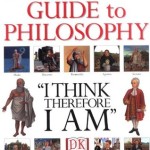 Philosophy today began with a shift away from “I” as the Key to understanding reality. Instead, thinkers started probing into human “structures”. Language, science, and society itself all came under scrutiny. One of the most important changes in philosophy today ids the emphasis put on words and how they reflect the world.
Philosophy today began with a shift away from “I” as the Key to understanding reality. Instead, thinkers started probing into human “structures”. Language, science, and society itself all came under scrutiny. One of the most important changes in philosophy today ids the emphasis put on words and how they reflect the world.
 Foucault (1926-1984): French thinker Michael Foucault was interested in the way the past is coloured by social attitudes. He dug into the history of thought and exposed the changing face of human nature. Foucault pointed out, for example, how mad people were once viewed as ——– and treated with respect. Today madness is treated as a sickness, and the insane are isolated by society.
Foucault (1926-1984): French thinker Michael Foucault was interested in the way the past is coloured by social attitudes. He dug into the history of thought and exposed the changing face of human nature. Foucault pointed out, for example, how mad people were once viewed as ——– and treated with respect. Today madness is treated as a sickness, and the insane are isolated by society.
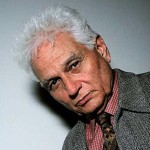 Derrida (1930-): Jacques Derrida was born in Algeria, studied in France, and now works in California. He invented a way of thinking called “deconstruction”. Derrida threw doubt on the very tools used to describe all philosophical thought – words. He “deconstructs”, or pulls apart, language to show how there can be no fixed meaning. Words get in the way of the search for truth.
Derrida (1930-): Jacques Derrida was born in Algeria, studied in France, and now works in California. He invented a way of thinking called “deconstruction”. Derrida threw doubt on the very tools used to describe all philosophical thought – words. He “deconstructs”, or pulls apart, language to show how there can be no fixed meaning. Words get in the way of the search for truth.
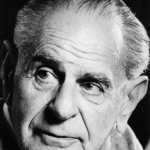 Popper (1902-1994): Karl Popper left Vienna for England in the 1930s. He became a “Sir” in 1965. Popper said science, far from being precise, was all just guesswork. He said you can believe a thing is true only if it can be proved to be untrue. His “falsification” method begins with provable truths like “There is a white cow in the field.” If true, this can falsify statements like “All cows are brown.”
Popper (1902-1994): Karl Popper left Vienna for England in the 1930s. He became a “Sir” in 1965. Popper said science, far from being precise, was all just guesswork. He said you can believe a thing is true only if it can be proved to be untrue. His “falsification” method begins with provable truths like “There is a white cow in the field.” If true, this can falsify statements like “All cows are brown.”
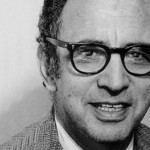 Kuhn (1922-1996): Like Kant before him, Thomas Kuhn’s work was called a revolution in thinking. American Philosopher Kuhn said that scientific research is not objective. It depends on its historical framework. This limits the field of evidence available to science. For example, scientists once thought the earth was the centre of the universe, then along came Copernicus with another idea.
Kuhn (1922-1996): Like Kant before him, Thomas Kuhn’s work was called a revolution in thinking. American Philosopher Kuhn said that scientific research is not objective. It depends on its historical framework. This limits the field of evidence available to science. For example, scientists once thought the earth was the centre of the universe, then along came Copernicus with another idea.
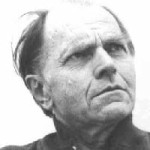 Feyerabend (1924-1994): Despite being crippled by a war wound, Paul Feyerabend was noted for his jolly personality. He thought philosophy should not be taken too seriously. Until he studied with fellow Austrian Popper, Feyerabend believed that science was the basis of knowledge. He later called all science theoretical, saying scientists defend their beliefs just like an ancient tribe defend their gods.
Feyerabend (1924-1994): Despite being crippled by a war wound, Paul Feyerabend was noted for his jolly personality. He thought philosophy should not be taken too seriously. Until he studied with fellow Austrian Popper, Feyerabend believed that science was the basis of knowledge. He later called all science theoretical, saying scientists defend their beliefs just like an ancient tribe defend their gods.
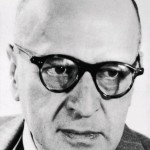 Horkheimer (1895-1973): Max Horkheimer was the first director of a German institute for social research, which opened in 1924. Its members used philosophy to examine and explain the present state of Western society. They were especially interested in the power money played in society and the success of Fascism. This Group of thinkers became known as the Frankfurt School.
Horkheimer (1895-1973): Max Horkheimer was the first director of a German institute for social research, which opened in 1924. Its members used philosophy to examine and explain the present state of Western society. They were especially interested in the power money played in society and the success of Fascism. This Group of thinkers became known as the Frankfurt School.
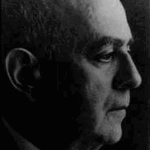 Adorno (1903-1963): Many think Theodore Adorno was the most brilliant member of the Frankfurt School. He worked closely with Horkheimer and together they wrote “The Dialectic of Enlightenment”, which is viewed as one of the most important philosophy books of the 20th century. The main theme is that the modern “age of reason” is no closer to the truth than any other.
Adorno (1903-1963): Many think Theodore Adorno was the most brilliant member of the Frankfurt School. He worked closely with Horkheimer and together they wrote “The Dialectic of Enlightenment”, which is viewed as one of the most important philosophy books of the 20th century. The main theme is that the modern “age of reason” is no closer to the truth than any other.
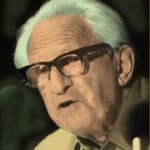 Marcuse (1898-1979): Herbert Marcuse studied under Husserl and Heidegger (whom he fell out with) before he joined the Frankfurt School. He became the most politically active member of the group. Marcuse mixed Marxism with Freudian psychology. The result was the surprising optimistic view of the future. He thought technology would free people from the oppression of hard, boring work.
Marcuse (1898-1979): Herbert Marcuse studied under Husserl and Heidegger (whom he fell out with) before he joined the Frankfurt School. He became the most politically active member of the group. Marcuse mixed Marxism with Freudian psychology. The result was the surprising optimistic view of the future. He thought technology would free people from the oppression of hard, boring work.
Source: “A Young Person’s Guide to Philosophy”, by: Jeremy Weate